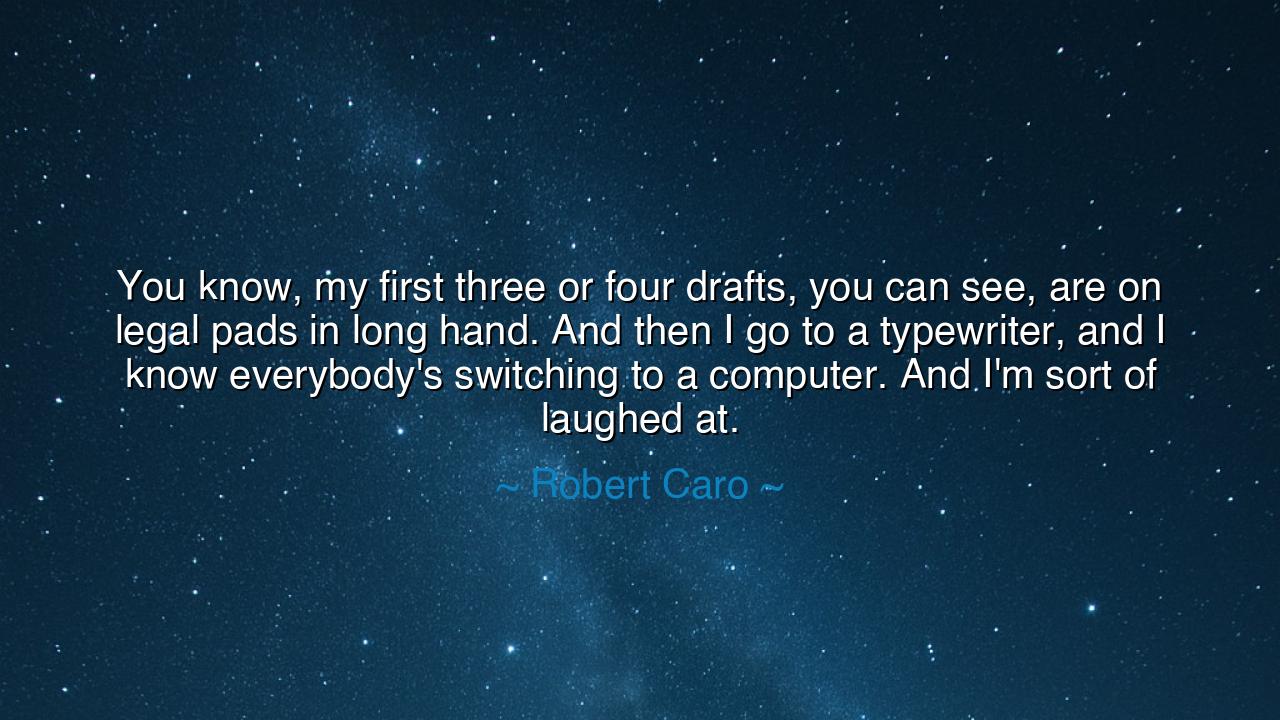
You know, my first three or four drafts, you can see, are on
You know, my first three or four drafts, you can see, are on legal pads in long hand. And then I go to a typewriter, and I know everybody's switching to a computer. And I'm sort of laughed at.






Hear, O seekers of craft and endurance, the words of Robert Caro: “You know, my first three or four drafts, you can see, are on legal pads in long hand. And then I go to a typewriter, and I know everybody's switching to a computer. And I'm sort of laughed at.” These words speak not merely of paper and ink, nor of machines old and new, but of the devotion of a man to his method, and the courage to hold to his chosen path while the world rushes elsewhere. In them we see the eternal struggle between tradition and change, between the quiet slowness of the hand and the swift blinking of the screen.
The legal pad, humble and yellow, becomes in his hand a tablet of destiny, where thoughts are born slowly, each letter carved by patience. The typewriter, with its steady clatter, becomes his forge, where raw words are hammered into form. And though others turn to computers, shimmering with speed and convenience, Caro holds to his ritual. He is laughed at, yes, yet he endures, for he knows that greatness is not measured by fashion, but by faithfulness to the process that brings forth truth.
The ancients, too, were mocked for their devotion. Consider the philosophers who wandered Athens, speaking in the marketplace while others chased wealth and pleasure. Socrates himself was ridiculed for his persistence in asking questions, yet it was his method that lit a fire in the minds of generations. So too does Caro remind us: the laughter of others is often the shadow cast by their misunderstanding, while devotion to one’s craft, even when unfashionable, brings forth works that endure.
Think of the scribes of old, who copied sacred texts by hand, hour after hour, year after year, though new tools might have promised speed. Because of their patient labor, words were preserved that might otherwise have vanished in time’s abyss. So too with Caro, whose longhand drafts slow the pace of thought, forcing him to wrestle with each word, to choose not what is easy, but what is right. His labor is not waste, but discipline; not weakness, but strength.
The meaning of his words, then, is not only about writing, but about all life. The world may rush toward what is quick, new, and efficient, but wisdom often dwells in what is slow, tested, and deliberate. To be laughed at for one’s devotion is no shame; the true shame is to abandon one’s path for fear of mockery. Caro shows us that endurance in craft, even against the tide, is itself a form of courage.
The lesson for future generations is this: do not measure your worth by the tools of the age, but by the fidelity of your labor. If your work requires slowness, embrace slowness. If your vision requires methods others deem obsolete, yet your heart knows them to be true, then walk that path unashamed. Greatness is born not from speed but from depth, not from novelty but from perseverance.
Practical action lies open before all: find the method that makes your spirit clear, and cling to it. Do not despise the old because it is old, nor worship the new because it is new. Choose instead what brings forth your best self, and let the laughter of others be as wind in the trees—heard, but powerless to shake your roots. For in the end, it is not the manner of your writing, or working, or living that endures, but the truth you leave behind.
So let it be remembered: the legal pad, the typewriter, even the ridicule of others—all these are but instruments in the hand of a devoted craftsman. What matters is not the tool, but the soul that wields it. And when the world forgets its fashions, the works born of patience and courage will yet stand, testaments to the power of fidelity in the face of laughter.






AAdministratorAdministrator
Welcome, honored guests. Please leave a comment, we will respond soon